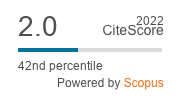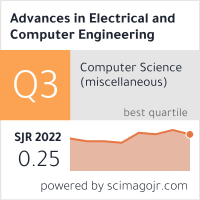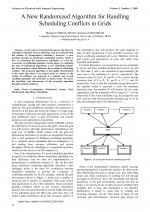| 3/2009 - 5 |
A New Randomized Algorithm for Handling Scheduling Conflicts in GridsVAHDAT-NEJAD, H. |
| View the paper record and citations in |
| Click to see author's profile in |
| Download PDF |
Author keywords
coordination, distributed system, grid, randomized algorithms, scheduling
References keywords
scheduling(6), distributed(6), computing(5), grid(4), algorithm(4)
Blue keywords are present in both the references section and the paper title.
About this article
Date of Publication: 2009-10-26
Volume 9, Issue 3, Year 2009, On page(s): 22 - 26
ISSN: 1582-7445, e-ISSN: 1844-7600
Digital Object Identifier: 10.4316/AECE.2009.03005
Web of Science Accession Number: 000271872000005
SCOPUS ID: 77954634405
Abstract
As the scale of Grid platforms grows, the idea of a centralized scheduler loses its efficiency, and it is replaced with the scheme of decentralized schedulers. However, a new problem emerges in distributed scheduling systems, which is how to coordinate the autonomous schedulers to avoid the occurrence of conflicting schedules. In this paper, by exploiting the idea of randomized algorithms, a new scheduling scheme has been proposed, which addresses the problem of scheduling conflicts. The proposed algorithm is thoroughly decentralized in the sense that there is no central point of contact in the system. In addition, our approach is a suitable way toward reaching scalability and autonomy in future Grids. We prove the feasibility and effectiveness of the proposed algorithm through statistical analysis. |
| References | | | Cited By «-- Click to see who has cited this paper |
| [1] I. Foster and C. Kesselman, grid: "Blueprint for a new computing infrastructure", Morgan Kaufmann Publishers, USA, 1998 [PermaLink]
[2] Hamed Vahdat-Nejad, Reza Monsefi, Hossein Deldari, "Distributed resource scheduling in grid computing using fuzzy approach", Proceedings of the International Conference on Information and Knowledge Technology, Iran, 2007 [3] HU Rong, HU Zhigang, "A scheduling algorithm aimed at time and cost for meta-tasks in grid computing using fuzzy applicability", Proceedings of the eighth International Conference on High-performance Computing in Asia-pacific region, IEEE 2005 [CrossRef] [Web of Science Record] [SCOPUS Times Cited 7] [4] Hamed Vahdat-Nejad, Reza Monsefi, Mahmoud Naghibzadeh, "A new fuzzy algorithm for global job scheduling in multiclusters and grids", Proceedings of International Conference on Computational Intelligence for Measurement Systems and Applications, Italy, 2007 [CrossRef] [Web of Science Times Cited 1] [SCOPUS Times Cited 4] [5] Hamed Vahdat-Nejad, Reza Monsefi, "Static parallel job scheduling in computational grids", Proceedings of the International Conference on Computer and Electrical Engineering, Thailand, 2008 [CrossRef] [Web of Science Times Cited 3] [SCOPUS Times Cited 5] [6] Rajiv Ranjan, Aaron Harwood, Rajkumar Buyya, "A case for cooperative and incentive-based federation of distributed clusters", Future generation computer systems, Elsevier, 2007 [CrossRef] [Web of Science Times Cited 17] [SCOPUS Times Cited 24] [7] Ashraf Osman, "Introduction to randomized algorithms", West Virginia University [8] Rajiv Ranjan, Mustafizur Rahman, and Rajkumar Buyya, "A decentralized and cooperative workflow scheduling algorithm", Proceedings of eighth IEEE International Symposium on Cluster Computing and the Grid, 2008 [CrossRef] [SCOPUS Times Cited 28] [9] Hoong Chuin Lau, Shih Fen Cheng, Thin Yin Leong, "Multi-period combinatorial auction mechanism for distributed resource allocation and scheduling", Proceedings of IEEE/WIC/ACM International Conference on Intelligent Agent Technology, 2007 [CrossRef] [Web of Science Times Cited 18] [SCOPUS Times Cited 22] [10] Olivier Beaumont, Larry Carter, Jeanne Ferrante, Arnaud Legrand, Loris Marchal, and Yves Robert, "Centralized versus distributed schedulers for bag-of-tasks applications", IEEE Transactions on Parallel and Distributed Systems, Volume 19, No 5, May 2008 [CrossRef] [Web of Science Times Cited 30] [SCOPUS Times Cited 43] [11] L. Walras, "Elements of pure economics", Allen and Unwin, English translation by William Jaffe 1954 (originally published in 1874) [PermaLink] [12] J. Q. Cheng and M. P. Wellmam, "The WALAS algorithm: A convergent distributed implementation or general equilibrium outcomes", Computational Econ. 12: 1-24, 1998 Web of Science® Citations for all references: 69 TCR SCOPUS® Citations for all references: 133 TCR Web of Science® Average Citations per reference: 5 ACR SCOPUS® Average Citations per reference: 10 ACR TCR = Total Citations for References / ACR = Average Citations per Reference We introduced in 2010 - for the first time in scientific publishing, the term "References Weight", as a quantitative indication of the quality ... Read more Citations for references updated on 2024-04-18 02:54 in 45 seconds. Note1: Web of Science® is a registered trademark of Clarivate Analytics. Note2: SCOPUS® is a registered trademark of Elsevier B.V. Disclaimer: All queries to the respective databases were made by using the DOI record of every reference (where available). Due to technical problems beyond our control, the information is not always accurate. Please use the CrossRef link to visit the respective publisher site. |
Faculty of Electrical Engineering and Computer Science
Stefan cel Mare University of Suceava, Romania
All rights reserved: Advances in Electrical and Computer Engineering is a registered trademark of the Stefan cel Mare University of Suceava. No part of this publication may be reproduced, stored in a retrieval system, photocopied, recorded or archived, without the written permission from the Editor. When authors submit their papers for publication, they agree that the copyright for their article be transferred to the Faculty of Electrical Engineering and Computer Science, Stefan cel Mare University of Suceava, Romania, if and only if the articles are accepted for publication. The copyright covers the exclusive rights to reproduce and distribute the article, including reprints and translations.
Permission for other use: The copyright owner's consent does not extend to copying for general distribution, for promotion, for creating new works, or for resale. Specific written permission must be obtained from the Editor for such copying. Direct linking to files hosted on this website is strictly prohibited.
Disclaimer: Whilst every effort is made by the publishers and editorial board to see that no inaccurate or misleading data, opinions or statements appear in this journal, they wish to make it clear that all information and opinions formulated in the articles, as well as linguistic accuracy, are the sole responsibility of the author.





